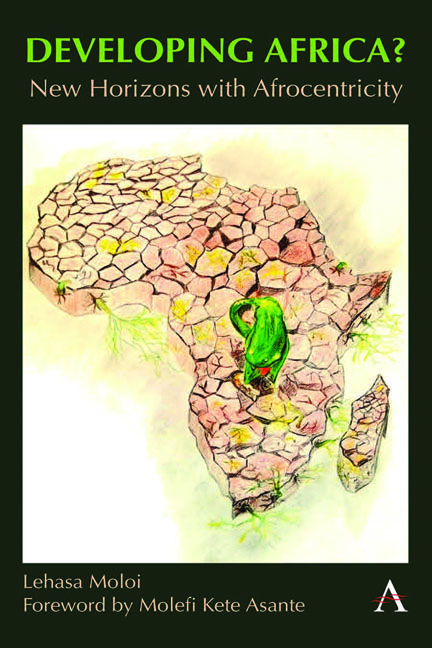Book contents
- Frontmatter
- Contents
- Foreword
- Preface
- Acknowledgements
- Relevance of the Dialogue
- Overview of the Book
- 1 Introduction
- 2 Theoretical Grounding: Afrocentricity’s Approach to Development
- 3 Critique of Eurocentrism and a Mapping of African Development Initiatives
- 4 Afrocentricity on the Significance of African History for Development
- 5 Afrocentricity on the Significance of Culture in the Conceptualization of an African Development Paradigm
- 6 Afrocentricity on the Significance of African Agency in Development in Africa
- Bibliography
- Index
Preface
Published online by Cambridge University Press: 13 April 2024
- Frontmatter
- Contents
- Foreword
- Preface
- Acknowledgements
- Relevance of the Dialogue
- Overview of the Book
- 1 Introduction
- 2 Theoretical Grounding: Afrocentricity’s Approach to Development
- 3 Critique of Eurocentrism and a Mapping of African Development Initiatives
- 4 Afrocentricity on the Significance of African History for Development
- 5 Afrocentricity on the Significance of Culture in the Conceptualization of an African Development Paradigm
- 6 Afrocentricity on the Significance of African Agency in Development in Africa
- Bibliography
- Index
Summary
This book is written for those who are interested in theoretical debates as they relate to the field of Development Studies. It is aimed at academics and all those who work in the field of development, politicians, policymakers and civil servants who need to familiarize themselves with key historical development debates, especially those relevant to Africa. The book takes an Afrocentric intellectual standpoint, grounded in the theory of Afrocentricity, in its interrogation of the ideas and processes of development in Africa. It also adopts a historical approach in its interrogation of the idea of African development as a by-product of political deliberations. This book is about how the discourse of development as a field of study needs to be reoriented to African-based epistemologies to dismantle coloniality, in opposition to the historical embeddedness of development discourse in Eurocentrism.
This book contests the limitation of the modern African understanding of Africa's journey with development to the period of the aftermath of World War II, to be specific, to President Harry S. Truman's 1949 Point Four programme. Instead, that journey should be understood holistically. By this, I mean that Africa's engagement with development did not begin with the politics of the Euro-North American political bloc – the story of African development must take into consideration Africa's classical civilization, namely the Nile Valley civilization and its contributions to human civilization. Such an approach provides a more holistic interrogation and casts light on how Africa's history of greatness continues to be an inspiration even in modern times. Such an approach rejects the many reductionist lies and half-truths that undergird the modernist paradigm which seeks to portray African people as dependent beneficiaries of the colonial Euro-modernity framework. This framework has undermined the humanity of non-western people in general, and Africans in particular. The book pursues the tradition of decolonial epistemic reflections to oppose discourses that are riddled with a racist agenda towards those in the Global South, especially Africans. In the spirit of the pursuit of cognitive justice in the twenty-first century, this book argues that the discourse of development must be decolonized from hegemonic Eurocentric propaganda and needs to be framed from the viewpoint of those who have been seen as being on the receiving end, those projected as ‘backwards’ from a Eurocentric perspective.
- Type
- Chapter
- Information
- Developing Africa?New Horizons with Afrocentricity, pp. ix - xPublisher: Anthem PressPrint publication year: 2024

